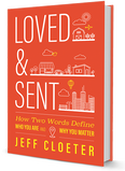|
There are things in life that we cannot explain. And the only word we can use is “somehow.” Like this: Your body is made up of 7 billion billion billion atoms. That’s 7 octillion. In and of themselves, atoms are not alive. They are just lifeless matter, mindless particles. But somehow they come together in a fantastic puzzle that constitute a living, breathing, YOU.
As a college student I was tall, skinny, and awkward. I was largely clueless to female attention. And somehow Bobbi found me interesting. Somehow she talked to me. Somehow she said “yes” when I asked her to marry me. Somehow! It’s a word you use when there is no logical explanation. A word that admits mystery and miracle. It’s a word of faith and hope.
2 Comments
This post is the third in a series on the modern pressure to build an identity.
I was speaking about identity at a conference last fall. As an outline, I used Nouwen’s three temptations: “I am what I do, what I have, or what others say about me.” During a break, a young woman in her twenties approached me and said, “That third one is what we struggle with the most.” “We.” She had been sitting in a row of fellow twenty-somethings. Every one of them confessed a struggle with “that third one.” “What others say about me.” We chatted briefly about why Gen Z struggles with this particular temptation. Is it the ubiquitous presence of social media? Or could it be the insecurity of a generation formed by pandemic isolation and political division? Regardless, there is a real temptation to build an identity by gaining approval from others. Target and Walmart had Christmas displays up before Thanksgiving. Then we had Black Friday, Small Business Saturday, and Cyber Monday. Now there's the rush of the final shopping days before the holiday. Christmas is an economic engine. Gift-giving is big business.
I’ve always found this funny. It’s Jesus’ birthday, and we give each other presents. “I am what I have.” You think this one doesn’t apply to you. Materialism seems like a juvenile sin. Of course, shiny things can bring you pleasure. In a consumerist society we are tempted to get more and have more. More money, more stuff, more travel, more retirement, more trendy clothes and expensive dinners.
“I am what I have” seems too obvious a temptation. Materialism is easy to identify and even easier to deny. But I think there’s something deeper going on. I continue my series on identity. I’m working out a thesis that every human being is tempted to construct an identity, a self that we desire to be. In a series of posts, I'll address three ways we seek to build an identity and three historic Christian practices that provide a better answer to the identity question. Henri Nouwen provides the inspiration for self-diagnosis. We’ll begin with the first, “I am what I do.” I am what I do, what I have, or what others say about me.” - Henri Nouwen Every weed has a root. I contend that under every sin is an identity issue. It's a thesis I’ve been working with for awhile. The worst things about us are often an attempt to justify a self made identity. Greed, ego, self-importance, addiction, sexual conquest. These are symptoms of something deeper. There’s always a root under the stem and leaves.
A teenager asked me, “Would you ever use Chat GPT to write a sermon?” The controversy around AI generated papers and essays is vigorous. But I hadn’t given much thought to using artificial intelligence to write a sermon.
I must admit I’ve never used Chat GPT. But here’s why I won’t use it for sermons. Texting forces you to be clear and concise. It’s harder to say something important in 50 words than it is in 500 or 5,000. Every word counts.
So my daughter is at a public university and having conversations about faith. She texted, “Dad. My roommate is asking about Lutherans. Not sure what to say.” Remembering something from a mentor of mine, I texted back: I wrote a book a few years ago. I did it for my church and for pastors-in-training who were asking to take resources to their first churches. The title is Loved & Sent. In a narrative way, it explores the heart of Christianity through the lens of identity and purpose.
These two words emerged through the hard knocks of life and ministry. As a new pastor I was connecting with college students and young adults for whom the church was a liability and Jesus was merely an interesting dead guy. I wondered, “Does this Christian thing even matter? How much difference does it really make? Should I get a real job?” What if you could invent a religion? You’d probably make its central figures heroic and virtuous. All the characteristics we wish we had. This is true of most ancient religions and mythologies. They are typically a picture of a peoples' aspirations more than they are of reality.
I only know of one religion that is scandalously sober in its assessment of its key leaders. Only the faith named for Jesus, the Christ, has such a scathing view of her adherents. |
JOIN My Tribe
|












